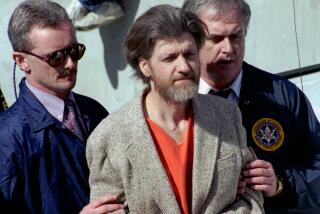Kaczynski’s Lawyers Eye Penalty Phase
- Share via
SACRAMENTO — As jury selection in the Unabomber trial resumes today, potential jurors’ deepest feelings about the death penalty will again be put under a public microscope.
Legal experts say that with evidence seemingly stacked against suspect Theodore Kaczynski, the case is not much of a whodunit. So the trial attorneys, especially the defense team, are shifting their focus to questions on the penalty phase of the trial.
They are prospecting for jurors who would not automatically send Kaczynski to his death even if they determine that he deliberately sent bombs to maim and kill people.
Kaczynski, 55, is charged with 10 criminal acts in connection with four blasts that killed two Sacramento men and seriously injured two academicians.
The former UC Berkeley mathematics teacher, who was arrested 19 months ago at his tiny Montana cabin, has pleaded not guilty. Prosecutors are attempting to use his diaries, which were found in his cabin and allegedly describe the attacks, to send him to his death.
Sacramento is not unfamiliar with the tug-of-war over capital punishment.
The state Capitol, a few blocks from the federal courthouse, has been the backdrop for many heated political debates on the issue. Those debates have reflected the public’s increasing embrace of the death penalty.
Sentiment among the jurors called to the courthouse for Kaczynski’s trial seems to mirror the nation’s growing belief in the ultimate punishment. A Harris poll earlier this year said that three-quarters of the nation now supports capital punishment.
But the courtroom probing triggers soul-searching among even some staunch death penalty advocates. This is not some abstract questionnaire, not a rhetorical clash on the floor of the Legislature.
The questions are specifically about Kaczynski, sitting a few feet away. Potential jurors are being asked, in effect, whether they could with clear consciences decide that Kaczynski should be executed if he is found guilty.
In the first two days of jury selection last week, the answers of potential jurors reflected the emotions, sometimes rooted in religion, that swirl around the issue.
In a dramatic moment Thursday, a weeping woman identified only as Juror No. 16 told U.S. District Judge Garland E. Burrell Jr.: “I can’t vote for the death penalty. I’m sorry.” A court clerk gave her tissues to wipe away her tears.
“I can see that my questions have caused you to have tears,” Burrell said, but he nonetheless pressed her on whether her stand was merely a ploy to get off the jury.
“No sir, I would tell you the truth,” said the juror, who attorneys for both sides agreed should be excused.
One man, who described himself as the sole support of his wife and five children, offered a contrasting opinion. Like all those being quizzed, his identity was not revealed.
The man, who told the court that it appeared from news stories that Kaczynski is the elusive Unabomber, said he favors the death penalty but could put aside that view if the facts of the case warranted.
“Basically, I feel it’s a deterrent” to crime, he said, citing the biblical “eye for an eye.”
“If you take someone’s life . . . the punishment should be similar,” the prospective juror told Burrell.
After one woman said she favors the death penalty, she was asked by Robert Cleary, a special U.S. attorney, how her views might be affected by her undisclosed religion’s commandment against killing.
“I have to separate religion and the way I feel,” she said, declaring that she could put her theological views aside while deliberating Kaczynski’s fate.
Others said they didn’t have a strong stand on capital punishment.
“I’m not 100% one way or another,” said one man. Under questioning, he said he would favor it only as a last resort, possibly for repeat offenders.
The potential jurors sit across the wood-paneled courtroom from Kaczynski, no longer disheveled as he was when he was arrested. He now wears sport coats, slacks and open-collar dress shirts. Sometimes the Chicago native will briefly put on a pair of glasses, as he huddles with his attorneys and jury consultant.
Judy Clarke, one of his lawyers who is a passionate opponent of the death penalty, was asked by reporters at the conclusion of last week’s questioning for her assessment of the proceedings.
“I think we are asking a lot of questions,” she said, and not just on the death penalty. “It’s a long process.”
More to Read
Get the L.A. Times Politics newsletter
Deeply reported insights into legislation, politics and policy from Sacramento, Washington and beyond. In your inbox twice per week.
You may occasionally receive promotional content from the Los Angeles Times.










